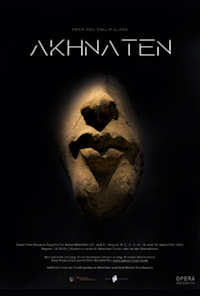the archaeological world will celebrate several significant anniversaries. On the one hand, it is the 200th anniversary of Heinrich Schliemann's birth, on the other hand, in 1822 the then 31-year-old linguist Champollion deciphered the Egyptian hieroglyphs and thus opened the doors to a global audience for a direct understanding of the most fascinating cultural areas of antiquity. Both events and personalities have burned themselves deeply into the collective memory of a historically interested world public and are still considered milestones and icons of creative discovery and the performance of the human spirit. The independent Munich opera collective Opera Incognitawould like to pay tribute to these events with the Munich premiere of the celebrated music theater installation " Akhnaten " by Philip Glass . As the pinnacle of minimal music, Glass is also well known to those audiences who only want to deal with contemporary trends in classical music to a limited extent or not at all, not least because of his much-quoted film music and opera performances. With this project, Opera Incognita hopes to give a younger audience access to new perspectives on the opera genre, which is often said to be dead. As early as 2018, the music theater collective tried out the renowned State Museum of Egyptian Art in Munichas a venue for a very original version of Verdi's "Aida". Now that we have become a little more familiar with the spatial and acoustic conditions there, we feel able to perform the complex micro-structures and musical variances of this pinnacle of 20th century music.
II
As the conclusion of his trilogy about important visionaries and thinkers, Philip Glass completed his opera about the Egyptian pharaoh Akhenaten in 1984. After Einstein and Gandhi, he dedicated a kind of personal examination to what is probably the most ambiguous and enigmatic visionary in his trilogy, an almost aleatoric game with perspectives and contexts of meaning history and belief. In a wealth of freely associated scenic spaces, Glass, who also acts as the librettist in this work, directs the perspective to a kind of hallucinated life story of Akhenaten's 17-year reign. Glass created iconographic space-time structures, each elliptically devoted to a single thematic center. In large-scale musical streams of consciousness he created an opulent panorama, which leads the viewer from the death of the father, the coronation ceremony of Akhenaten to the installation of the legendary Aten cult and its abolition. Last but not least, one of the numerous highlights of the opera is the “Hymn”, Akhenaten's possibly self-written ode to the sun. Private aspects of the early founder of state monotheism also find their place in Glass's large-scale musical architecture. Akhenaten's marriage to Nefertiti and their six daughters are also assigned chapters as well as the joint creation of the new capital of the empire - Akhetaton, the building of a new temple, the destruction of the old gods and the Amun cult that had been in force until then. A huge musical monument is also erected to the creation of the famous sun hymn, before the opera builds a bridge to our present and describes the long-forgotten brutal clashes between rulers and the administrative apparatus as traces in the sands of history. Alongside ancient pyramid texts and eulogies in Egyptian, Akkadian and Aramaic, Glass weaves the texts of a scribe figure into a large, symbolic portrait of perhaps the most controversial figure in ancient Egyptian history. In a sensuous discourse, Akhenaten's personal revenge campaign against the thoughts of his dominant father Amenhotep III is discussed, as well as the aggressive retention of power, the dogged establishment of a new state order and the futility of human ambition in the face of the overpowering judgment of the night world. the use of incest, the state-imposed iconoclasm and the excessive use of symbols today raise doubts about the integrity of the "visionary" Akhenaten. Countless critical voices from renowned archaeologists now draw an ambivalent picture of this ruler who was as withdrawn as he was power-conscious.With this project, Opera Incognita engages in an examination of the hubris of the human will to assert oneself, the fatal effects of a fanatical will to reform, but also the impenetrable jungle of currents of political power and the constant struggles between bureaucrats and visionaries. Using a wide variety of theatrical disciplines such as acting, dance performance, video design and interactive audience discourse, we are attempting to create a kind of installative world theater in the large, claustrophobic exhibition hall of the SMAEK that reflects the eternal socio-political currents, the everlasting desire for radical change and the dangerous longing for staged new leader figures. Opera Incognitastages Philip Glass' streams of consciousness as a great pandemonium of human abysses in front of the defiant concrete wall of the museum hall. The achievements and upheavals of world history pass before us in an eternal procession, until audience and performers fall into the inescapable trance of memory and reflection that these musical theater worlds inevitably create. Unlike in most performances of Philip Glass's works, the focus is not on the aesthetic furnishings and decorative show values, but on seriously dealing with the systematic overwriting of history by the "victors" of all eras. We are less interested in the illustrations of this spherical music than in a serious, open dispute about the narcissism of those in power, reform and counter-reform, the relationship between freedom and security as well as the omnipresent question of the sense and madness of religion. Not least because of the close cooperation with the museum itself, guided tours are offered that enable the public to contextualize Glass's dystopian utopia in advance.




